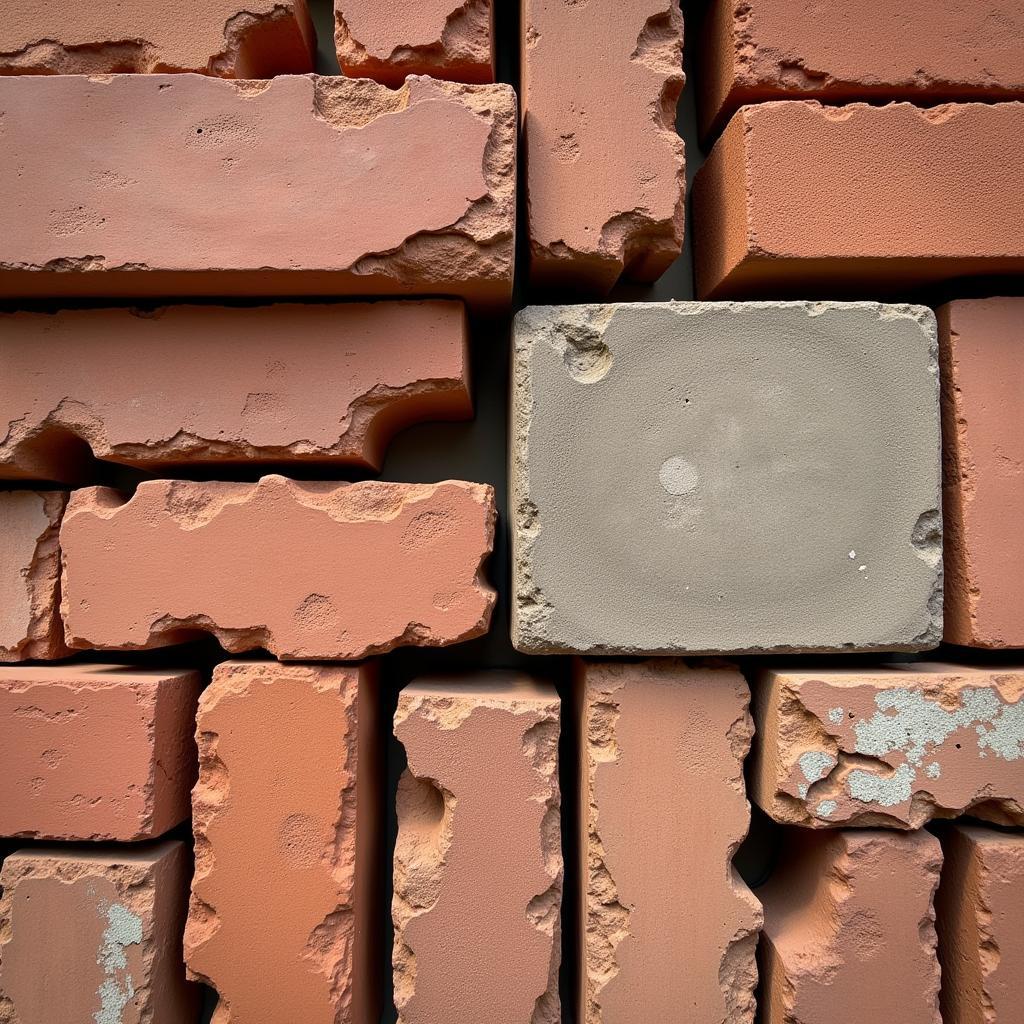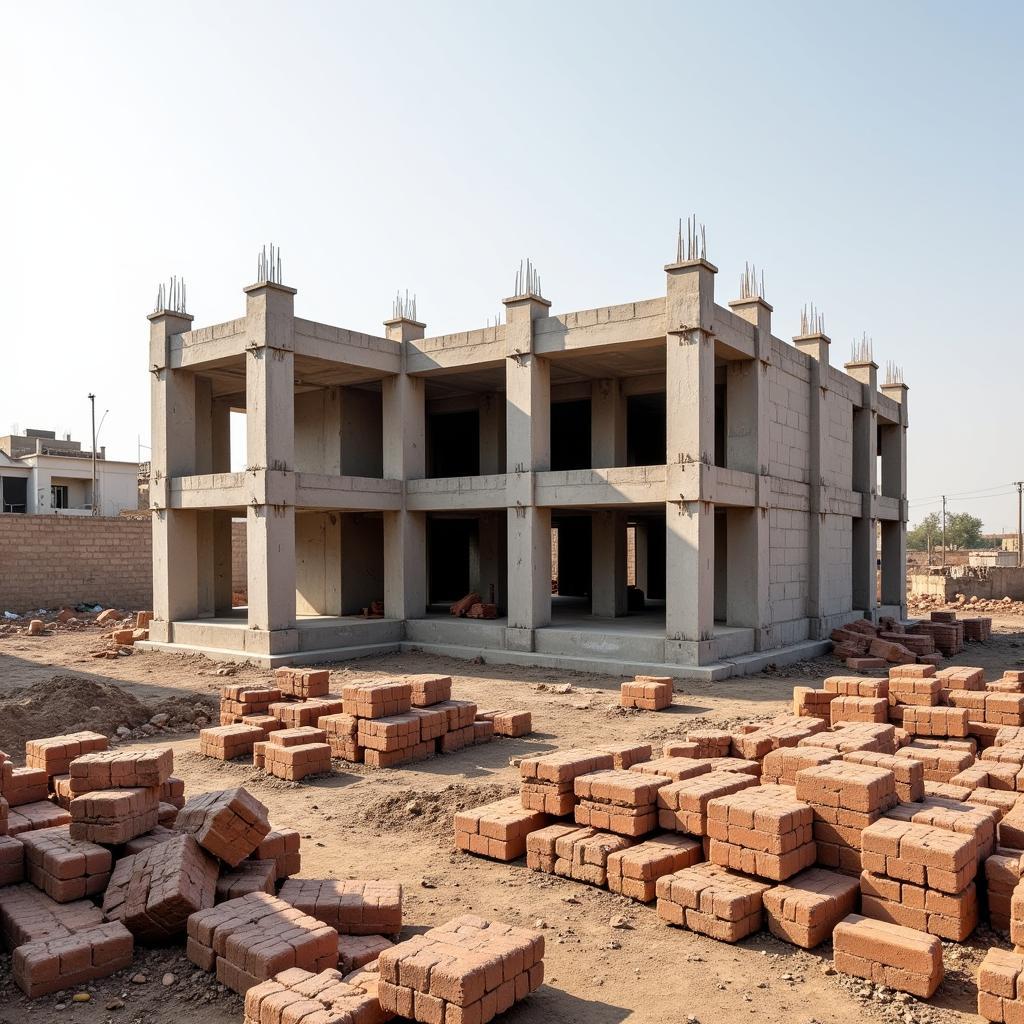Pakistan, with its booming construction industry, relies heavily on readily available and diverse building materials. Among these, bricks hold a prominent place, forming the backbone of countless structures across the country. This comprehensive guide delves into the world of bricks in Pakistan, exploring the different types available, their applications, and factors influencing their selection.
Unraveling the World of Bricks: Types and Applications
 Common Brick Types in Pakistan
Common Brick Types in Pakistan
Bricks, the quintessential building blocks, are available in a surprising array of types, each with its own set of properties and ideal use cases. Let’s take a closer look at the most common brick types found in Pakistan:
1. Burnt Clay Bricks: The Traditional Choice
Burnt clay bricks, often referred to as common bricks, are the cornerstone of traditional Pakistani construction. Made from clay molded and fired in kilns, these bricks offer excellent compressive strength, making them suitable for load-bearing walls, columns, and foundations.
2. Concrete Blocks: Strength and Versatility
Concrete blocks have gained immense popularity in recent years due to their exceptional strength, durability, and versatility. Made from a mixture of cement, aggregates, and water, these blocks come in various sizes and shapes, catering to diverse construction needs. From load-bearing walls to retaining walls and fences, concrete blocks offer a robust and cost-effective solution.
3. Fly Ash Bricks: An Eco-Friendly Alternative
As environmental concerns take center stage, fly ash bricks have emerged as a sustainable alternative to traditional clay bricks. These bricks utilize fly ash, a byproduct of coal combustion, as a key ingredient, reducing the environmental impact associated with brick production.
 Fly Ash Bricks in Pakistan Construction
Fly Ash Bricks in Pakistan Construction
Factors Influencing Brick Selection in Pakistan
Choosing the right type of brick is crucial for the structural integrity, longevity, and aesthetics of any construction project. Several factors come into play when selecting bricks in the Pakistani context:
-
Cost: Burnt clay bricks, being readily available and traditionally manufactured, are often the most affordable option. However, concrete blocks and fly ash bricks, though initially more expensive, can offer long-term cost savings due to their durability and lower maintenance requirements.
-
Strength and Durability: The strength and durability requirements vary significantly depending on the type of structure being built. Load-bearing walls and foundations demand high-compressive strength, making burnt clay bricks or concrete blocks the preferred choices.
-
Aesthetic Appeal: Bricks are not just structural elements but also contribute to the visual appeal of a building. Burnt clay bricks, with their warm, earthy tones, lend a classic charm, while concrete blocks offer a more modern aesthetic. Fly ash bricks, available in various colors and textures, provide a sustainable and aesthetically pleasing option.
-
Availability: The availability of different brick types can vary depending on the geographical location within Pakistan. While burnt clay bricks are widely available throughout the country, concrete blocks and fly ash bricks might be more readily accessible in urban areas or regions with specific manufacturing facilities.
Navigating the Pakistani Brick Market
Pakistan’s brick industry is characterized by a mix of traditional kilns and modern manufacturing units. While traditional kilns predominantly produce burnt clay bricks, modern facilities cater to the rising demand for concrete blocks and fly ash bricks.
When procuring bricks in Pakistan, it’s essential to source them from reputable suppliers who adhere to quality standards. Factors such as the firing temperature for clay bricks, the composition of concrete blocks, and the quality of fly ash used in brick production significantly influence the final product’s quality and performance.
Conclusion
Bricks, with their timeless appeal and structural significance, will continue to shape the landscape of Pakistan. By understanding the different types of bricks available, their properties, and factors influencing their selection, builders, architects, and homeowners can make informed decisions, ensuring the construction of durable, aesthetically pleasing, and sustainable structures.
FAQs about Bricks in Pakistan
1. What is the average price of 1000 bricks Pakistan?
The price of 1000 bricks can vary based on type, quality, and location, but you can expect to pay between PKR [insert approximate price range].
2. Where can I find the current bricks rate in pakistan?
Several online resources and local suppliers provide updated brick rates. You can also check construction material websites.
3. Are there any regulations on brick manufacturing in Pakistan?
Yes, environmental regulations are in place to control emissions from brick kilns and promote sustainable practices.
4. Can I use fly ash bricks for load-bearing walls?
Yes, fly ash bricks with appropriate compressive strength are suitable for load-bearing walls.
5. How do I calculate the number of bricks needed for my project?
You can use a construction cost calculator pakistan or consult with a professional contractor for accurate estimations.
For further assistance and information on bricks and other construction materials, please contact us at +923337849799, email us at news.pakit@gmail.com or visit our office located at Dera Ghazi Khan Rd, Rakhni, Barkhan, Balochistan, Pakistan. Our dedicated team is available 24/7 to address your queries and provide comprehensive support for all your construction needs. You can also find more information about Pakistan Steel Mills on our website.